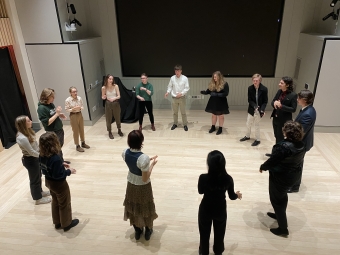
The Dartmouth Rude Mechanicals: Richard II Era
One of my favorite student groups that I'm a member of is the Dartmouth Rude Mechanicals, a student-run Shakespeare Company (If you're curious, the name comes from Act 3, Scene 2 of Shakespeare's A Midsummer Night's Dream). This past term, we did a production of Richard II, one of Shakespeare's history plays.
Auditioning for the Rude Mechanicals
I auditioned for the company during the first week of my freshman fall, but we host auditions just about every term. If you want to be in company shows, you generally have to be in the company, where show auditions and company auditions are separate. Once you're in the company, however, you can be in any show we do.
Production Process for a Show
A show gets pitched at the end of the term before it will be produced. So, for example, at the end of fall term, Richard II was pitched to the company and approved. This term (fall term), company auditions happened during week 1 and show auditions for Richard II happened during week 2.
For the first few weeks of the rehearsal process, rehearsals would be structured as follows:
- Theater warmups (articulation, stretches, games, etc. – always very fun!)
- Reading the scene and asking any clarifying questions needed – Shakespeare's works are written in English, but it is such antiquated English that sometimes it feels like reading something in a foreign language. Because of this, folks are always free to ask questions during the rehearsal process: the performers have to know what's happening if we want the audience to know what's happening!
- Blocking the scene – this part was done by our director, Mitchell Ransden '23, but also was partially devised. If you're an actor reading this, or if you've ever done devised theater, you may know what I'm referring to. For our show, it meant that actors were encouraged to make suggestions for blocking at any time, and all suggestions were attempted – and they often made it into the final blocking for the scene!
- Running the Scene – after we blocked it, we'd run the scene a few times to smooth out any issues that came up.
Once the whole show was blocked, we spent about a week and a half running larger portions of the show: so, instead of doing one scene at a time, we started rehearsing one act at a time, to start smoothing out the transitions between scenes.
When we got to tech week (week 8 of the 10 week term) we were running the whole show every night, but in a variety of creative ways. The first night we did a "line through" (no blocking, just saying lines to each other as efficiently as possible), the next night a "cue-to-cue" (just running scene transitions set movements, and lighting cues), the third an Italian run through (where you do everything as fast as possible, excluding fight choreography), and by opening night (well, opening afternoon) we all felt very prepared! We performed two shows in Dartmouth Hall 105, a beautiful, brand new lecture hall, and the shows were quite well attended. My fellow cast members and I all had friends, peers, mentors, and even a few professors attend! It was a great performance experience, and we got overwhelmingly positive feedback from our audiences.

Community
I've met many of my closest friends within this group. In addition to spending rehearsal time together, we frequently get meals as a group, hang out, and generally connect with each other throughout the term. The group is overwhelmingly accepting and inclusive. Since our productions are entirely student-led and created, we grow really close because we are all passionate about making the show work: one of our cast members made our poster, and another choreographed the fight scenes, we all met up and helped each other memorize and practice our lines – memorizing Shakespeare is no joke! I went on an impromptu afternoon grocery run with our director to get chocolate powder to create fake blood for Richard's death scene. We all sent selfies to the stage manager wearing potential costumes from what we had in our closet. On the surface, we are a group of students coming together to create a full, successful, inspired production. Beneath all that, we're just friends having fun and doing what we love.
Looking Forward…
If you are a theater kid, Shakespeare enjoyer, English Major, or just like the sound of what we do, audition when you come to Dartmouth! We'd be happy to have you! And stay tuned for another post about our Shenanigans later this term: this time, featuring Shakespeare's tragedy, Coriolanus!


















